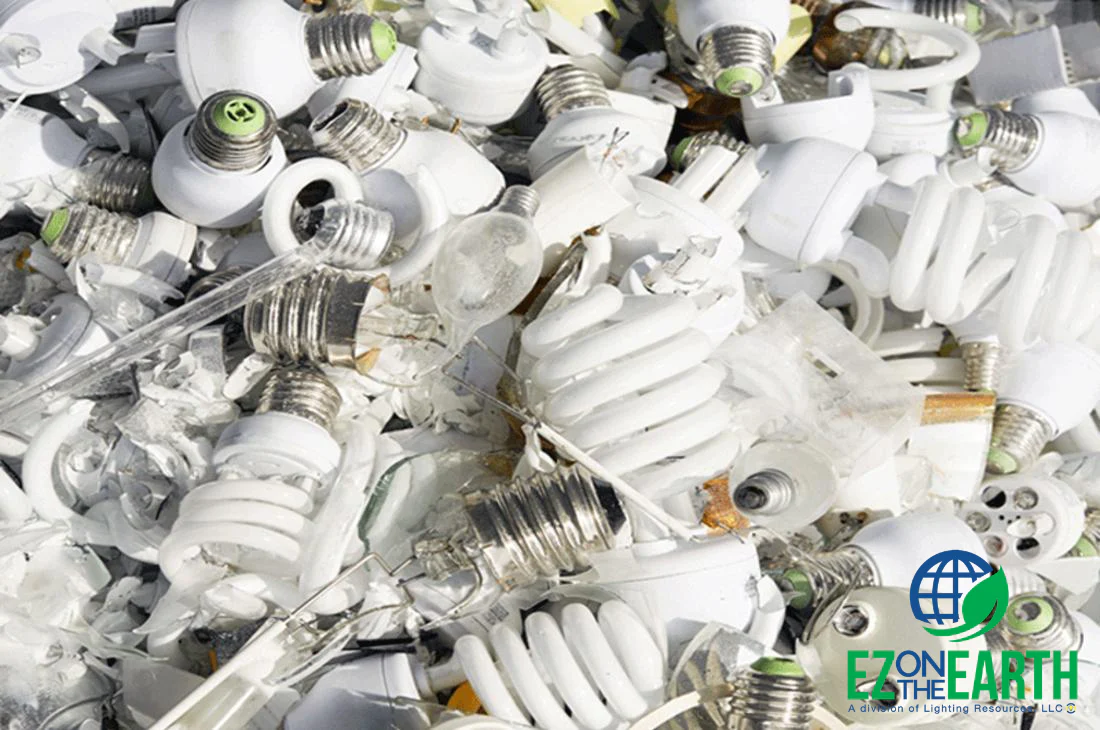In an era where environmental responsibility is more important than ever, the way we dispose of everyday items like light bulbs can have a significant impact on our planet. While it might seem inconsequential, choosing how to dispose of used bulbs can either harm or help our environment. This guide aims to illuminate the importance of bulb recycling services, highlighting their crucial role in both protecting our planet and ensuring compliance with environmental regulations.
The Environmental Impact of Traditional Bulb Disposal
Improper disposal of light bulbs has far-reaching consequences that extend beyond individual actions. When bulbs are simply tossed away with regular trash, they tend to end up in landfills. Many types of bulbs, such as fluorescent tubes and compact fluorescent lamps (CFLs), contain hazardous materials like mercury. When these bulbs break, they release mercury into the environment, which can contaminate soil and water supplies. This becomes a serious health risk as mercury can accumulate in the food chain, affecting not just wildlife but also human populations who rely on contaminated water and food sources.
Beyond mercury, broken bulbs can release other pollutants into the air, contributing to air quality issues. This is particularly concerning in areas near landfills, where communities may already be vulnerable to environmental hazards. These pollutants can contribute to respiratory problems and other health issues in humans.
In contrast, responsible recycling of bulbs can prevent these harmful effects and protect both the environment and public health. Recycling ensures that hazardous components are handled and processed safely, preventing their release into the environment. It also allows for the recovery of valuable materials, reducing the need for raw material extraction and conserving natural resources.
Understanding Bulb Recycling Services
Bulb recycling is a process that involves the safe collection, transportation, and processing of used light bulbs to recover valuable materials and prevent environmental contamination. Unlike traditional disposal methods, recycling services are equipped to handle the complex components found in modern lighting technology.
Recycling services begin with the collection of used bulbs from homes, businesses, and industry sectors. These services often provide specialized containers to ensure that bulbs are safely stored and transported to recycling facilities. Once at the facility, bulbs are carefully dismantled to separate and reclaim materials like glass, metal, and phosphor powder, while safely managing hazardous substances like mercury.
Choosing bulb recycling is more than just a responsible choice—it’s a step towards sustainable living. By opting for recycling services, consumers and businesses can significantly reduce their carbon footprint and contribute to a healthier planet. Recycling also supports the circular economy by turning waste into valuable resources, closing the loop on product life cycles.
Benefits of Bulb Recycling for Consumers and Businesses
Engaging in bulb recycling services offers numerous benefits that extend beyond environmental protection. For consumers, recycling can provide peace of mind knowing that they are actively contributing to sustainable practices. It also reduces household hazardous waste, making homes safer for families.
For businesses, the advantages are far-reaching. Recycling bulbs can reduce waste disposal costs by diverting materials from landfills. It also enhances corporate social responsibility (CSR) efforts, demonstrating a commitment to sustainability that can improve brand reputation and customer loyalty. In some regions, businesses that engage in recycling may also qualify for tax incentives or rebates, further enhancing cost savings.
Socially, both consumers and businesses play a role in fostering a culture of sustainability. By recycling bulbs, you contribute to community efforts to protect the environment, setting an example for others to follow.
How to Choose a Reliable Bulb Recycling Service
When selecting a bulb recycling service, it’s essential to choose one that is reputable and compliant with environmental regulations. Here are some tips to help you make an informed decision:
- Certification and Compliance: Ensure the service provider is certified by relevant environmental agencies. Compliance with regulations ensures that your bulbs will be recycled safely and responsibly.
- Collection Options: Look for services that offer convenient collection options, such as pickup services or local drop-off points. This makes it easier to recycle regularly without inconvenience.
- Reputation and Reviews: Research the service provider’s reputation by reading customer reviews and testimonials. A well-regarded service is more likely to provide reliable and high-quality recycling services.
Case Studies and Success Stories
Many businesses and individuals have successfully implemented bulb recycling programs, reaping both environmental and financial rewards. For example, a small office in California began recycling its bulbs and discovered it could save on waste disposal fees. Additionally, the company received positive feedback from clients and employees, who appreciated the business’s commitment to sustainability.
In another instance, a school district adopted a comprehensive recycling program for its facilities, including bulb recycling. This initiative not only reduced waste but also educated students about the importance of environmental stewardship, creating a ripple effect of awareness throughout the community.
These success stories demonstrate that bulb recycling is both practical and beneficial, with real-world impacts that extend beyond immediate cost savings.
Future of Bulb Recycling
The future of bulb recycling holds promising potential, especially as technology continues to advance. In the context of a circular economy, recycling will become increasingly important as industries seek to minimize waste and maximize resource efficiency. Innovations in recycling technology will further enhance the ability to recover materials from used bulbs, making recycling even more effective and economically viable.
Furthermore, increased awareness and education about the benefits of recycling are expected to drive greater participation among consumers and businesses alike. As more people engage in recycling, the demand for robust and efficient recycling services will grow, leading to further advancements in the sector.
Conclusion
Bulb recycling services offer a straightforward yet impactful way to protect the environment and ensure regulatory compliance. By choosing to recycle, you are taking an active role in reducing pollution, conserving resources, and promoting a sustainable future. Whether you’re an eco-conscious consumer, a business owner, or an environmentalist, engaging in bulb recycling is a powerful step towards a healthier planet.
For those looking to make a difference, consider partnering with reputable recycling services and encouraging others to do the same. Together, we can create a brighter, more sustainable world—one bulb at a time.









